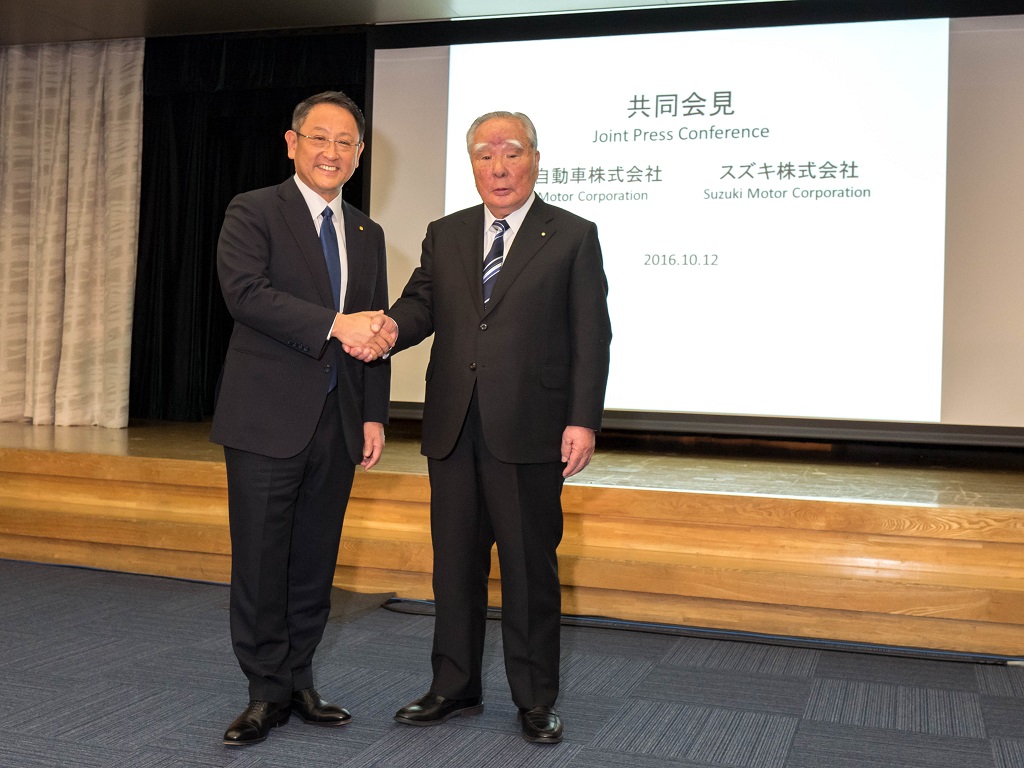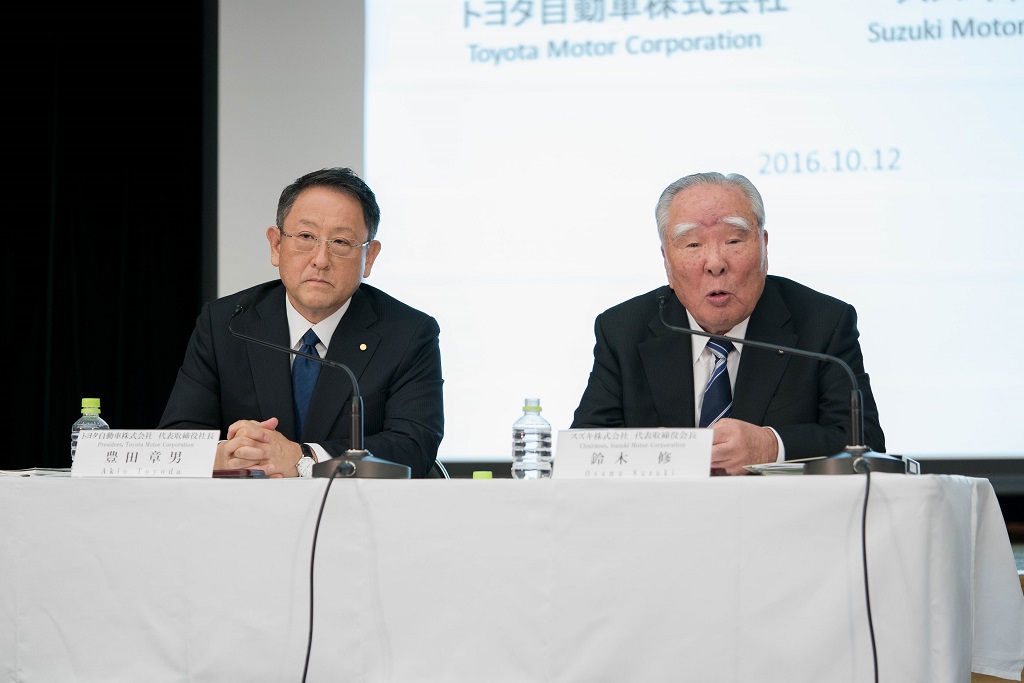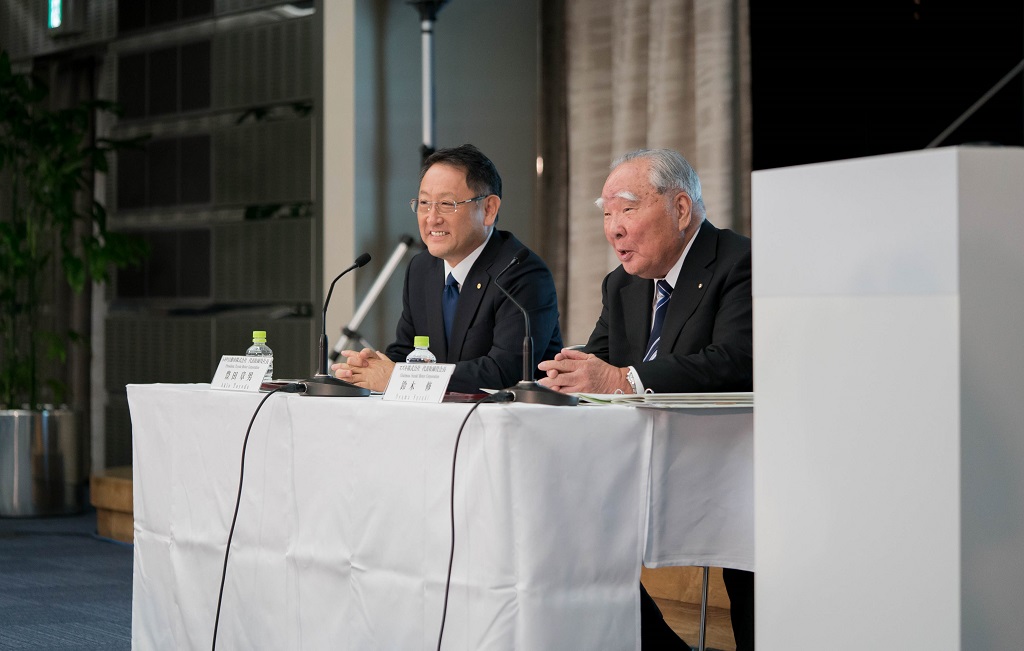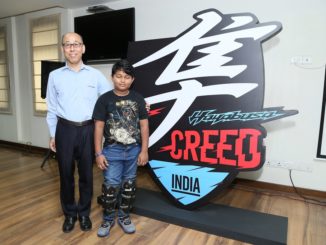– To strengthen collaboration in the environment, safety, and information technology fields –
Suzuki Motor Corporation (Suzuki) and Toyota Motor Corporation (Toyota) announced that both companies have agreed to start exploring ideas that are directed towards a business partnership.
The environment surrounding the automotive industry has been changing drastically and rapidly in an unprecedented fashion. As such, the industry is required to work not only on conventional automobile R&D, but also on R&D for advanced and future technologies in the fields including environment, safety, and IT. In addition to the R&D that is conducted by individual companies, it is increasingly important to work together with other companies on areas such as infrastructure development, as well as the establishment of new industrial standards.
With its primary focus on minivehicles, Suzuki has been consistently refining its technologies so as to develop vehicles with high price competitiveness. However, in the face of the advanced and future technology R&D field, Suzuki is increasingly feeling a sense of uncertainty. On the other hand, although Toyota has been working on R&D in the environment, safety, and information technology fields, Toyota is conscious of the fact that it may be behind competitors in North America and Europe when it comes to the establishment of standardizations and partnership with other companies.
Toyota and Suzuki just started exploring on any opportunities for collaboration, with the belief that it will help both companies solve their respective challenges. This discussion is based on the prerequisite that both companies continue to compete with each other in a fair and independent manner. Toyota and Suzuki will also be open to other companies regarding this collaboration idea, and aims for standardization in the industry.
Osamu Suzuki, Chairman of Suzuki, stated: “Toyota is the industry-leading, and the most reliable company which is actively working on various advanced and future technologies. I am appreciative that Suzuki is able to start discussions with Toyota to explore ideas on a partnership. I first spoke about this possibility with Toyota’s Honorary Chairman Shoichiro Toyoda, and am very grateful that President Akio Toyoda has also showed an interest. We will proceed with discussions for the future of Suzuki.”
Akio Toyoda, President of Toyota, said: “As the environment which surrounds the automobile industry has been changing drastically, we need to have the ability to respond to changes in order to survive. In addition to the R&D which each company is working on individually, it is very important now to have partners who share the same goal and passion. We would like to always keep our doors open for new partnership opportunities, which will contribute to the making of ever-better cars as well as to the development of the automotive industry.”
Remarks by Osamu Suzuki, Chairman of Suzuki Motor Corporation
Good Evening, I am Osamu Suzuki. Thank you very much for your support which you have extended to us on a daily basis. I am also appreciative that you have taken time out of your busy schedules to attend this news conference. In addition, I would also like to thank President Akio Toyoda for hosting us here at Toyota.
I would like to briefly talk about our decision to start exploring ideas on a business partnership with Toyota. As we have been saying, we remain determined to manage Suzuki as an independent corporation.
However, technological competition in the automotive industry in areas such as information technologies has been evolving rapidly. As you may know, Suzuki’s current business focuses on minivehicles in Japan, and in India, when it comes to operations outside of Japan. Even in such countries, we have understood that there will be uncertainty in the future if we only continue to just refine our traditional automobile technologies which we have been working on thus far.
I have been discussing these issues with Toyota’s Honorable Chairman Shoichiro Toyoda at various times, and quite recently―I think it was less than a month ago―I ventured further to discuss with him about whether we can explore on ideas to collaborate with Toyota. We were pleased that he had responded that “It would be good to at least discuss the potential collaboration between the two companies.”
Last week, President Akio Toyoda had also expressed an interest in the idea of collaboration with Suzuki, and we agreed to discuss on the nature of the collaboration which we could work on together.
I am very grateful to President Toyoda for accepting our idea to start the discussion, and I am determined to proceed with it for Suzuki’s future.
Thank you very much for your attention.
Remarks by Toyota’s President Akio Toyoda
Thank you very much, Chairman Suzuki. I am Akio Toyoda.
Thank you all very much for taking the time to come to our Toyota Tokyo office at such a late hour, especially when you are all busy. Also, I appreciate all of your constant support which you have so kindly extended to us.
Please let me talk about our decision to explore ideas on the partnership with Suzuki as well.
As Chairman Osamu Suzuki had mentioned earlier, technical competition, such as in the area of information technologies, has been changing drastically at an unprecedented speed.
In addition to efforts to tackle environmental and energy issues, as well as to ensure our customers’ safety and security, we are required to work on the R&D of advanced and future technologies, such as on automated driving.
However, in these fields, there is a limit to the R&D which each company is conducting individually. We have to be mindful of the management resource, and additionally, be conscious that it is increasingly important to collaborate with other companies on the coordination of infrastructure and the creation of partnerships for the establishment of industrial standards.
At the joint news conference held with Daihatsu earlier this year, I said that Toyota is not really good at creating alliances. Traditionally, Toyota had been fixated on the need to be able to cover all of our own bases. However, as the surrounding environment is changing drastically, we need to have capability to respond to changes in order to survive. This is exactly the challenge that Toyota has to overcome now.
We at Toyota are now making efforts for the future, such as through our initiatives which help to promote the creation of a hydrogen society, as well as R&D in the artificial intelligence and robotics fields. In these areas, we are collaborating with other companies to work together on R&D.
Although we are still halfway there, I believe that we have to go forward with the understanding of the importance of the need to create partnerships and the establishment of standardizations.
We received an offer from Suzuki regarding collaboration possibilities on advanced and future technologies such as in information technology. Suzuki made a frank proposal to us, and in understanding that Toyota is facing the challenges which I had mentioned earlier, we thought that with the relationship between both companies, there is an opportunity for a business partnership to help solve such challenges. As such, we decided to explore such possibilities together.
We would like to always keep our doors open for new partnership opportunities, which will contribute to the making of ever-better cars as well as to the development of the automotive industry.
Toyota has a subsidiary, Daihatsu, as well. Daihatsu will take on a central role in our compact car business for emerging markets. Based on this understanding, we will proceed with discussions about partnership opportunities with Suzuki, while taking applicable regulations into account.
Lastly, my current thought is on the fact that I am standing with Chairman Osamu Suzuki here. He is a great senior who has been leading the industry for a long time. In addition, both Suzuki and Toyota had originated from the Enshu area, and share similar histories on the establishment of our respective companies. I feel deep emotional ties about this fact. I sincerely hope that our collaboration will help carve out the way for the future of the automotive industry.
Thank you very much for your kind attention.





